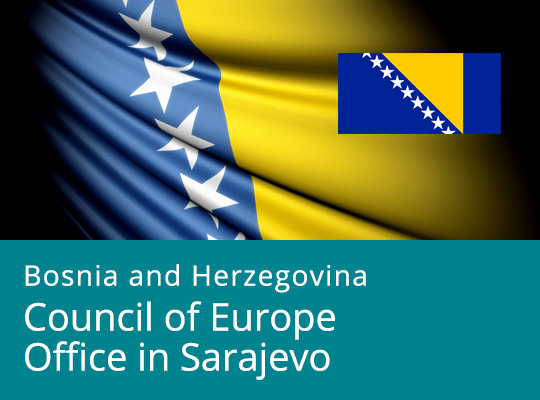The issue of radicalisation and violent extremism in prisons is a widespread challenge across the Western Balkans region that requires special attention of all relevant authorities in order to effectively address this phenomenon. Further fostering of prison capacities, inter-institutional cooperation, establishing local multi-agency teams to prevent and counter violent extremism (P/CVE) in prisons and providing adequate post-penal support to released offenders is of vital importance for their successful rehabilitation, concluded the participants at the regional conference on “Addressing radicalisation in prisons and managing violent extremist offenders”, which was held on 25 March 2021 in a virtual format. The conference also marked the closing of the 30-month project “Structured sentence management for violent extremist prisoners in Bosnia and Herzegovina”, which was funded by the UK Government and USAID office in Bosnia and Herzegovina, and implemented by the Council of Europe in close cooperation with the Ministries of Justice of Bosnia and Herzegovina, Federation BiH and Republika Srpska and their respective partners from both state and entity level law-enforcement agencies, social welfare services, as well as with other relevant stakeholders.
Mr Josip Grubeša, Minister of Justice of Bosnia and Herzegovina, opened the conference by welcoming the participants from BiH and the region, and highlighted the significance of openly discussing and exchanging experiences on matters related to violent extremism in prisons. “This project has allowed us to analyse the gaps in our institutional framework and practical shortcomings, as well as to learn from good European practices when it comes to countering radicalisation in prisons and management of violent extremist offenders, thus providing us with the know-how and skills to ensure sustainable restructure of our prison system to effectively deal with these serious challenges”, said the Minister in his speech.
“The issue of violent extremist prisoners, their rehabilitation and resocialization, remain important to both the BiH public and this country’s partners, like the UK and US”, highlighted in his opening speech HE Matthew Field, British Ambassador to Bosnia and Herzegovina. He further added that “now it is for BiH institutions to continue undertaking activities focused on strengthening prison capacities in order to prevent further violent extremism. It is only then that we can eliminate the risk of re-radicalisation and make BiH, and all of our societies, a safer place to live.”
Ms Nancy J. Eslick, USAID Mission Director in Bosnia and Herzegovina, in her remarks emphasized that “like many prisons in Europe, BiH prisons are recognized hotbeds of extremist beliefs and ideologies. That’s why it was important to adopt a structured approach in dealing with violent and extremist prisoners.” She also stressed that “through this program, the US and UK supported relevant authorities to contain and prevent the spread of radicalism and violent extremist beliefs in BiH prisons and enhance security for BiH society. We did this by promoting the rehabilitation of violent and extremist prisoners and their reintegration into the community upon release.”
“The implementation of the BiH specific project supported the authorities in improving safety by promoting rehabilitation of violent extremist prisoners and setting preconditions for their reintegration once they are released from prison”, said Ms Tanja Rakušić-Hadžić, Head of the Criminal Law Co-operation Unit (CLCU).
She added that “under the auspices of a separate Regional action, co-funded by the European Union and the Council of Europe, the Council of Europe continues to provide the authorities throughout the Western Balkans region with continuous support in addressing radicalisation in prisons, rehabilitation of violent extremist prisoners and their reintegration back to the society.”
Ms Bojana Urumova, Head of the Council of Europe Office in Sarajevo, welcomed the development of two key strategic documents and a related action plan by the BiH authorities, and urged their swift adoption and incorporation into legislation and practice. “The strategic documents, which reflect Council of Europe recommendations and best practices, are an excellent starting point. They are designed to help staff in the prison system and in other institutions to confront a complex problem. The period of imprisonment presents an opportunity to identify and track radicalisation and to rehabilitate violent and extremist prisoners in a humane way and with full respect of their human rights. This opportunity should be seized in the interests of society at large.”, said Urumova.
The conference gathered more than 70 participants from Albania, Bosnia and Herzegovina, Kosovo*, Montenegro, North Macedonia and Serbia, including prison practitioners, law enforcement representatives, and representatives of the countering violent extremism coordination bodies who discussed among themselves good practices regarding preventing radicalisation and combatting violent extremism in prisons in the Western Balkans region, and issues related to the betterment of the regional cooperation.
*This designation is without prejudice to positions on status and is in line with UNSCR 1244 and the ICJ Opinion on the Kosovo Declaration of Independence.




